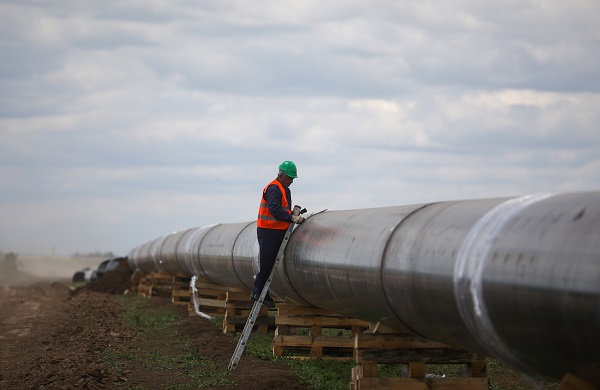 A worker is seen next to a pipe at a construction site on the extension of Russia's TurkStream gas pipeline in Letnitsa, Bulgaria, 1 June 2020;
Credit: Reuters/Stoyan Nenov/File Photo
A worker is seen next to a pipe at a construction site on the extension of Russia's TurkStream gas pipeline in Letnitsa, Bulgaria, 1 June 2020;
Credit: Reuters/Stoyan Nenov/File Photo
BRUSSELS/LONDON (Reuters) - On Tuesday 6 May 2025, the European Union will announce a roadmap to phase out the bloc's remaining gas ties with Moscow, but in the absence of sanctions it will be difficult for buyers to exit gas contracts using legal options such as force majeure.
The roadmap comes as the US is pushing Russia for a peace deal with Ukraine. If reached, the deal may reopen the door for Russian energy and ease sanctions.
Around 19% of Europe's gas still comes from Russia, via the TurkStream pipeline and liquefied natural gas (LNG) shipments, and the European Union has a non-binding goal to end Russian fossil fuel imports by 2027.
The Commission is exploring legal options to allow European companies to invoke force majeure and break their Russian gas contracts without facing penalties, as well as measures to forbid companies from entering into new contracts for Russian gas, a senior EU official said last month.
Lawyers and analysts said it was doubtful that force majeure would work, given the years that have passed since the EU vowed to end Russian gas imports in 2022, after Russia's invasion of Ukraine.
Agnieszka Ason, an independent energy lawyer specialising in LNG contracts, said that for force majeure to be declared, a supplier has to breach the contract, for example, through non-delivery. But remaining Russian supplies have been proved to be working well over three years of war.
"Any deliberate action that the EU would undertake already weakens the force majeure case. It's the opposite of what force majeure as a concept is about," said Ason, who is also a senior research fellow at the Oxford Institute for Energy Studies.
Legal experts said that sanctioning Russian gas imports is the most effective measure to phase out Russian gas.
That would require unanimous approval from all 27 EU countries, but Slovakia and Hungary have sought to maintain close political and business ties with Russia, and the latter has vowed to block energy sanctions.
Since the onset of the war in Ukraine, Gazprom and European companies have launched legal cases and counterclaims over breached gas contracts and missed payments. Based on court documents, Reuters calculations estimate these disputes to be worth around €18.5 billion.
Contracts with Russian gas firm Gazprom include "take-or-pay" terms that require buyers that refuse gas deliveries to still pay for up to 95% of the contracted volumes.
David Haverbeke, partner at law firm Fieldfisher, said the EU should focus on helping companies argue that a change in circumstances since 2022, such as the risks of purchasing Russian gas versus other supplies, should give them grounds to renegotiate, and potentially quit, their Russian contracts.
"I would try to rely on EU regulation passed since 2023 and invoke hardship based on the changes in the regulatory framework," he said.
Another option could be forcing companies to make future Russian LNG purchases via an EU joint buying scheme - and setting a maximum quota on the volumes that could be bought, Haverbeke added.








